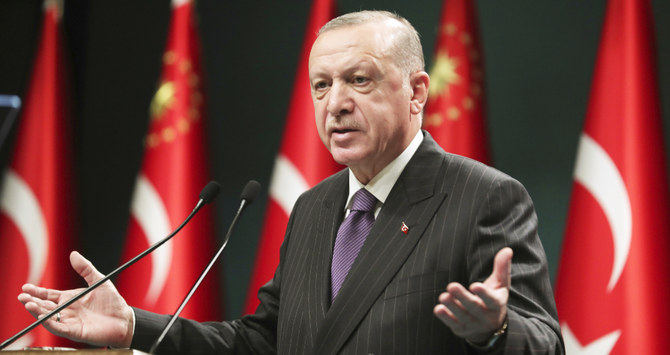
- ARAB NEWS
- 24 Apr 2024

The US on Monday announced sanctions on Turkey under the Countering America’s Adversaries Through Sanctions Act due to Ankara’s purchase of the Russian S-400 missile defense system. These sanctions will deny Turkey access to US defense products and technology, besides imposing asset freezes and visa restrictions on four senior officials from the Presidency of Defense Industries. The official US statement noted that the acquisition of the Russian missile system “would endanger the security of US technology and personnel.” The incoming Biden administration is expected to uphold the sanctions, as it has also opposed the S-400 purchase and the disunity within NATO that the Turkish acquisition has caused.
The EU had also announced sanctions on an unspecified number of Turkish officials and entities a few days earlier. These sanctions related to the eastern Mediterranean gas exploration dispute that Turkey has been engaged in with Greece and Cyprus. Athens blamed the “Berlin-Rome-Madrid bloc” for the soft response to Turkish aggressiveness. It had called for an arms embargo on Turkey, but both Italy and Germany are major arms suppliers to its hostile neighbor.
The US and EU sanctions, though mild, could discourage investments in Turkey — harmful for an economy already under strain. The national currency has depreciated 24 percent this year, while the inflation rate is 12 percent. The third quarter saw gross domestic product grow 6.7 percent due to the opening up of the economy and a government stimulus in the shape of low interest rates, fiscal spending, and increased credit. However, the recent surge in coronavirus disease infections, coupled with higher interest rates, will reduce growth in the fourth quarter, so that overall growth this year will be zero, before rising to 4 percent next year.
Joe Biden’s US presidential election victory poses fresh problems: Recep Tayyip Erdogan was personally close to Donald Trump, who backed Turkey at crucial times, particularly in Syria. There is now the need for a review of Turkey’s domestic and regional policies. Thus, sensitive to Biden’s concerns, Erdogan has already announced he is preparing a new human rights action plan.
The Turkish president is also attempting to repair ties with Israel. Erdogan this week appointed a Hebrew-speaking party loyalist, who is not a career diplomat, as Ankara’s ambassador to Israel. Diplomatic ties between the two countries were downgraded in May 2018 following Israeli violence in Gaza and Trump’s decision to shift the US embassy to Jerusalem. Since November, however, there have been substantial talks between Turkish and Israeli intelligence chiefs on upgrading diplomatic relations and their regional interests.
Turkey’s president will be reluctant to choose between the US and Russia, but will instead seek to veer between them
Talmiz Ahmad
Besides pleasing Biden, Turkey is also anxious to reconcile with Israel due to their shared energy interests in the Mediterranean. Ankara wants to revive the idea of an Israeli gas pipeline project that goes to Europe through Turkey. It also wants to coordinate their approach to the Caucasus, after both Turkey and Israel supported Azerbaijan in its recent conflict with Armenia over Nagorno-Karabakh. They could also be tempted to shape a trilateral partnership with Ukraine, where Turkey is already a defense supplier.
However, this wish-list may not go through as Israel has serious reservations about Turkey’s ties with Hamas and the Muslim Brotherhood. Meanwhile, Turkey’s Western allies are also reaching the limits of their patience. Outgoing US Secretary of State Mike Pompeo this month criticized Turkey for “undermining NATO’s security.” And, in a press conference in Paris last month, the French foreign minister described Turkey’s actions in the Mediterranean as “unacceptable,” while his German counterpart called them “inadmissible.”
Against this background, what will be the future shape of Turkey’s ties with Russia? Russian President Vladimir Putin has invested heavily in trying to detach Turkey from the Western embrace by developing substantial bilateral economic and military ties, accommodating Turkey’s interests in Syria and engaging with Ankara on matters relating to Libya, even though they back opposite sides. Russia also brokered the cease-fire in Nagorno-Karabakh, where again they had supported opposing parties.
Given his past record, Erdogan will be reluctant to choose between the US and Russia, but will instead seek to veer between them via the repeated acts of brinkmanship that have marked his diplomacy over the last few years. His trump card is his country’s geopolitical value — straddling Europe and Asia, its role in east-west energy transit, its dominant place along the Mediterranean coastline, and its oceanic outreach to Libya. There is also the large size of Turkey’s domestic market, both commercial and military, and its civilizational stature as the heir of the Ottoman Empire. These factors give Erdogan the confidence that both the US and Russia will remain sensitive to Turkey’s interests and positions.
But, with Trump on his way out and the Biden presidency much less tolerant of Erdogan’s unreliability as a NATO ally, the Turkish president may also find Putin not as accommodating as before. In Syria, the Russian president is likely to insist that Turkey give a free hand to the Assad government and Russian forces to fight the extremists in Idlib and affirm the country’s national unity. In Libya and Nagorno-Karabakh, Turkey will need to work closely with Moscow as the two countries seek to accommodate each other’s competing positions. For Putin, Ukraine will be a no-go area; Turkey will have to desist from any activity that threatens Russia’s interests.
Erdogan will soon discover that his traditional brinkmanship has strict limits.
• Talmiz Ahmad is an author and former Indian ambassador to Saudi Arabia, Oman and the UAE. He holds the Ram Sathe Chair for International Studies, Symbiosis International University, Pune, India.